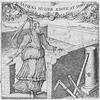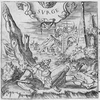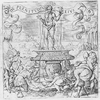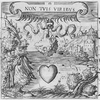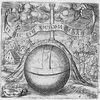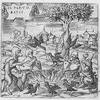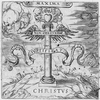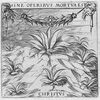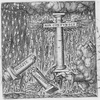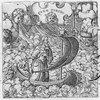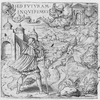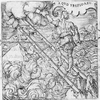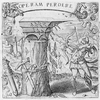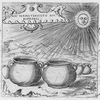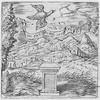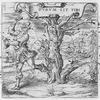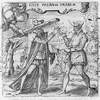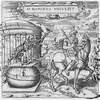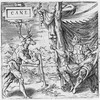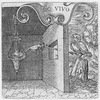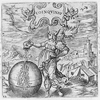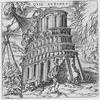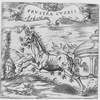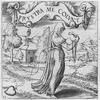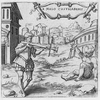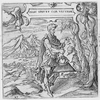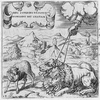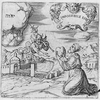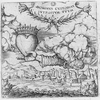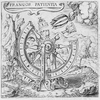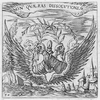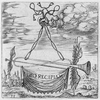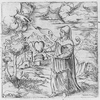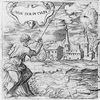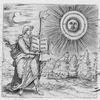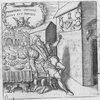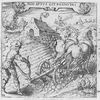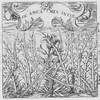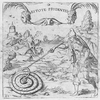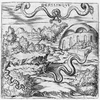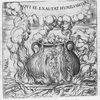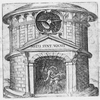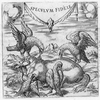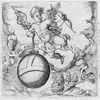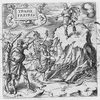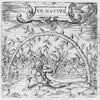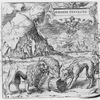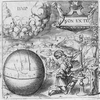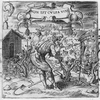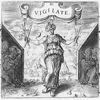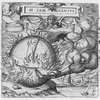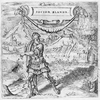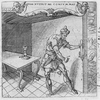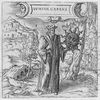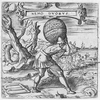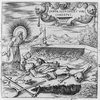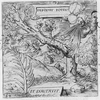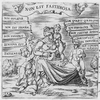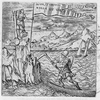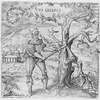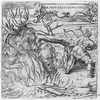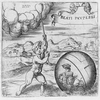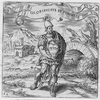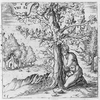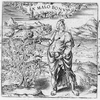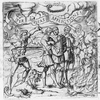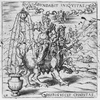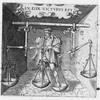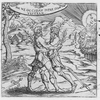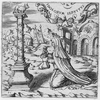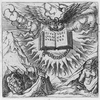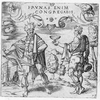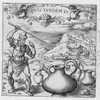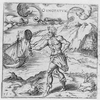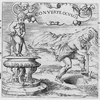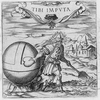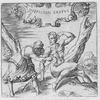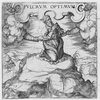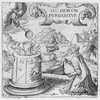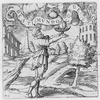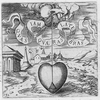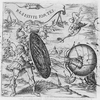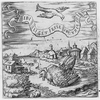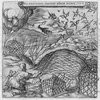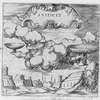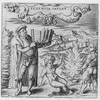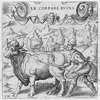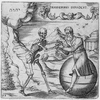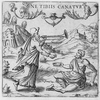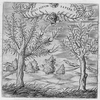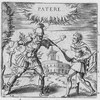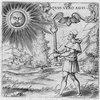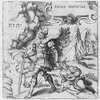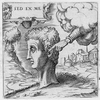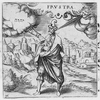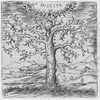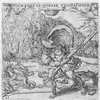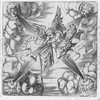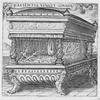Rectum judicium [4]
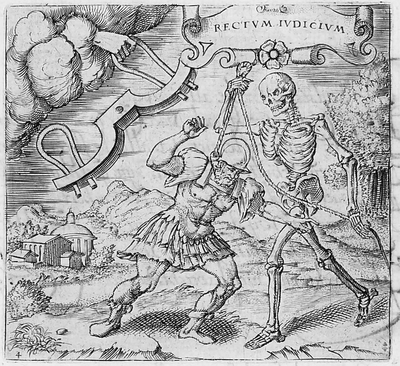
Cristus die voor ons heeft soo veele wtgericht
biedt ons sijn juck aen, dat soet, lieflijck is en licht
Maer veel ondanckbaere door hovaert stout ghedreven
Willen tot hun behout, haer daer niet onder gheven.
Bij Godt ist altemael. om niet ghij t' al verliest.
Nu ghij O Willens-quaet! Het slimst voort beste kiest.
Die dan hertneckich van het quaet niet sijn te wicken
Vallen Rechtvaerdich in des Doots en duijvels stricken.
biedt ons sijn juck aen, dat soet, lieflijck is en licht
Maer veel ondanckbaere door hovaert stout ghedreven
Willen tot hun behout, haer daer niet onder gheven.
Bij Godt ist altemael. om niet ghij t' al verliest.
Nu ghij O Willens-quaet! Het slimst voort beste kiest.
Die dan hertneckich van het quaet niet sijn te wicken
Vallen Rechtvaerdich in des Doots en duijvels stricken.

Le Fils de Dieu seul iuste & tout parfait,
Nous a son ioug doucement presenté:
Mais cest ingrat, qui conte n'en a fait,
S'est d'vn tel bien par orgueil absenté.
Puis donc qu'ailleurs n'est vie, ne santé,
Qui monstrera que Dieu luy ait fait tort,
Si le rebelle en sa temerité
S'est trouué pris du licol de la mort?
Nous a son ioug doucement presenté:
Mais cest ingrat, qui conte n'en a fait,
S'est d'vn tel bien par orgueil absenté.
Puis donc qu'ailleurs n'est vie, ne santé,
Qui monstrera que Dieu luy ait fait tort,
Si le rebelle en sa temerité
S'est trouué pris du licol de la mort?

Translations
 |
...
|
 |
...
|
 |
Right judgement.
|
Literature
-
Mentioned in: Henkel and Schöne, Emblemata
 , col. 1438f
, col. 1438f
Sources and parallels
-
Divine Love discouraging the soul from wordly life leading to death in: Peynst 'er wel op [41] (in: Jan van Hoogstraten, Zegepraal der goddelyke liefde (1709))
[Compare
![Compare [compare]](/static/images/compare2.gif) ]
]
-
Divine Love discouraging the soul from the wordly life leading to death in: Antipathia amoris et mortis. [12] (in: anonymous, Amoris divini et humani antipathia (1628))
[Compare
![Compare [compare]](/static/images/compare2.gif) ]
]
-
Divine Love discouraging the soul from the wordly life leading to death in: Monitio Amoris [19] (in: Ludovicus van Leuven, Amoris divini et humani antipathia (1629))
[Compare
![Compare [compare]](/static/images/compare2.gif) ]
]
-
Divine Love putting a yoke on the neck of the Soul in: Nullus liber erit, si quis amare volet [40] (in: Otto Vaenius, Amoris divini emblemata (1615))
[Compare
![Compare [compare]](/static/images/compare2.gif) ]
]
-
Divine Love putting a yoke on the neck of the Soul in: Nullus liber erit si quis amare volet [85] (in: Jan Suderman, De godlievende ziel (1724))
[Compare
![Compare [compare]](/static/images/compare2.gif) ]
]
-
Soul choosing between Death and Divine Love in: Desiderium amoris. [36] (in: anonymous, Amoris divini et humani antipathia (1628))
[Compare
![Compare [compare]](/static/images/compare2.gif) ]
]
-
Soul choosing between Death and Divine Love in: Impatientia Amoris [65] (in: Ludovicus van Leuven, Amoris divini et humani antipathia (1629))
[Compare
![Compare [compare]](/static/images/compare2.gif) ]
]
-
Soul choosing between Death and Divine Love in: Wie zoekt de Vryheit niet [11] (in: Jan van Hoogstraten, Zegepraal der goddelyke liefde (1709))
[Compare
![Compare [compare]](/static/images/compare2.gif) ]
]
-
Cupid's yoke is sweet to the lovers, in:Gratum amanti iugum [37] (in: Otto Vaenius, Amorum emblemata (1608))
[Compare
![Compare [compare]](/static/images/compare2.gif) ]
]
-
Cupid's yoke is sweet to the lovers, in:Gratum amanti iugum [37] (in: Otto Vaenius, Amorum emblemata (1608))
[Compare
![Compare [compare]](/static/images/compare2.gif) ]
]
-
Cupid's yoke is sweet to the lovers, in:Un Cupidon tenant le pied sur un Chapeau de liberté (in: Daniel de la Feuille, Devises et emblemes (1691))
[Compare
![Compare [compare]](/static/images/compare2.gif) ]
]
References, across this site, to this page:
- Antipathia amoris et mortis. [12] (in: anonymous, Amoris divini et humani antipathia (1628))
- Desiderium amoris. [36] (in: anonymous, Amoris divini et humani antipathia (1628))
- Monitio Amoris [19] (in: Ludovicus van Leuven, Amoris divini et humani antipathia (1629))
- Impatientia Amoris [65] (in: Ludovicus van Leuven, Amoris divini et humani antipathia (1629))
- Un Cupidon tenant le pied sur un Chapeau de liberté (in: Daniel de la Feuille, Devises et emblemes (1691))
- Wie zoekt de Vryheit niet [11] (in: Jan van Hoogstraten, Zegepraal der goddelyke liefde (1709))
- Peynst 'er wel op [41] (in: Jan van Hoogstraten, Zegepraal der goddelyke liefde (1709))
- Nullus liber erit si quis amare volet [85] (in: Jan Suderman, De godlievende ziel (1724))
- Gratum amanti iugum [37] (in: Otto Vaenius, Amorum emblemata (1608))
- Gratum amanti iugum [37] (in: Otto Vaenius, Amorum emblemata (1608))
- Nullus liber erit, si quis amare volet [40] (in: Otto Vaenius, Amoris divini emblemata (1615))
Iconclass
A soldier rejects the yoke that is offered by the hand of God; Death holds a noose around his neck- hand, 'Dextera Dei' ~ symbol of God the Father
[11C12]

- church (exterior)
[11Q712]

- low hill country
[25H114]

- farm or solitary house in landscape
[25I3]

- clouds
[26A]

- hand (+ holding something)
[31A2245(+933)]

- arm raised upward
[31A2511]

- arm stretched forward (+ indicating, pointing at)
[31A2512(+931)]

- violent death by hanging
[31E2355]

- Death as skeleton
[31F26]

- instruments of torture, execution or punishment (with NAME)
[44G321(NOOSE)]

- the soldier; the soldier's life
[45B]

- yoke
[46C14111]

- tools, aids, implements ~ crafts and industries: rope
[47D8(ROPE)]

- inscription
[49L8]

- Choice; 'Elettione' (Ripa) (+ emblematical representation of concept)
[53A11(+4)]

- Unwillingness (+ emblematical representation of concept)
[53BB4(+4)]

- Disobedience, Contumacy, Insubordination; 'Inubidienza' (Ripa) (+ emblematical representation of concept)
[53BB5(+4)]

- proverbs, sayings, etc. (with TEXT)
[86(RECTUM IUDICIUM)]

![[H O M E : Emblem Project Utrecht]](/static/images/rd-small.gif)





